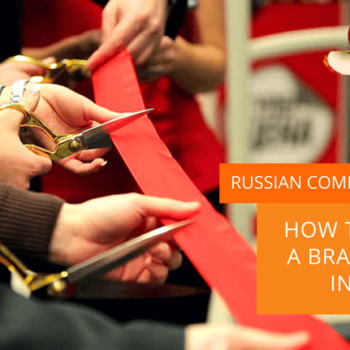
- Awara
- August 17, 2020
- 4152
Branch VS LLC. What Form is Better for Your Business in Russia
Branch of a Foreign Company and Limited Liability Company (Subsidiary Founded by а Foreign Company) in Russia:
Pros and Cons. Main Differences.
Foreign investors usually prefer to invest into Russia by setting up one of the two most common types of business in Russia:
- establishing a Branch of the foreign company and
- operating through a Limited Liability Company/LLC or OOO in Cyrillic (it could be establishing a new LLC with 100% foreign ownership, joint ownership with Russian partners, as well as through partial or full purchase of an existing LLC and its assets).
One option is to establish a Representative Office of the foreign organization, but the purpose of their establishment is only to represent the main company on the territory of Russia (search for partners, conduct market research, advertising campaigns, officially protect its rights, etc.). Since representative offices should not engage in commercial activities, representative offices are not considered in this review.
Foreign companies open branches in Russia to carry out commercial activities. Branches can only conduct such activities from the date of obtaining accreditation and tax registration. At present, an accreditation is issued for an indefinite term.
Another way of setting-up a business in Russia for foreign companies is to register a subsidiary – a limited liability company (“Obshchestvo s ogranichennoi otvetstvennostyu”, or “ООО” in Russian). After registering with the tax authorities, an LLC can carry out its business activities for an unlimited duration .
The table below summarizes the key features of branches and limited liability companies.
| Branch | LLC | |
| Legal Form and Liability | An integral part of the foreign legal entity. The head office is fully liable for obligations of the Branch. | A separate legal entity, liable for its own obligations. The liability of participants is limited to their shares. However, if insolvency occurred through the fault of participants or through the fault of other persons, who are entitled to issue instructions binding for LLC or otherwise are able to determine its acts, such participants or other persons may be held liable to obligations of the LLC in case of insufficiency of its assets. |
| Term of Existence | Term of accreditation is unlimited. | LLC is created for an indefinite period. |
| State fee | RUB 141,000 | RUB 4,000 |
| Term of registration | 25 working days | 5 working days |
| Governance | Director/Head of Branch/General manager acting pursuant to a power of attorney.
Greater control exerted by foreign legal entity. |
General Director(s) acting pursuant to the charter without a power of attorney. The General Director may take a broad range of action without prior approval of the participants and/or the Board of Directors.
|
| Name | The name of the Branch must repeat the name of the establishing company and contain the word “Филиал” (Filial, Russian for branch), as well as indicating the location of its tax registration. | There are no restrictions on the official name of the LLC (except of using such words as “Москва” (Moscow) and “Россия” (Russia), which require additional approval. |
| Financing | Facilitated transfer of funds that can be sent from the parent organization without restrictions and preparation of additional supporting documents, without currency control. The same applies to transfers in the opposite direction. | Participants’ contributions to the charter capital (which increases the amount of charter capital and requires additional registrations).
Contributions to property without an increase in charter capital do not require registration, but in any case it will be necessary to prepare appropriate corporate documents. Loans provided by the company’s shareholders. Gratuitous financial assistance from the company’s shareholder (without increasing the charter capital) – will also require the preparation of relevant documentation and currency control. |
| Employment |
All employment issues are governed by Russian law and the legal requirements are the same, regardless of the legal form. |
|
| Taxation | Subject to all taxation applicable for activities conducted in Russia.
In case the international agreement contains any other taxation rules and regulations besides those stipulated in the Russian Tax Code, the provisions of the international agreement shall be applied. Exempt from VAT on office lease only. |
Subject to all taxes in Russia.
|
| Financial reporting | Special requirements for financial statements. Financial statements should be prepared by an accountant with the relevant specialization and experience. | Depends on the nature and volume of activities. |
| Expenses | When calculating financial results, the branch may state a part of the parent company’s expenses. | When calculating financial results, the LLC can only state its own expenses. |
| Currency control and residency | A branch is a non-resident in terms of currency legislation. It can carry out settlements in Russia, both, in foreign currency and in rubles. It can also receive proceeds in Russia, both in foreign currency and rubles.
With non-residents, a Russian organization is entitled to carry out foreign currency transactions without restrictions. In other words, free use of foreign currency and rubles is possible in settlements with non-residents. |
Resident.
Currency transactions between residents are prohibited in Russia. |
| Currency | Sales in Russia can be conducted, in rubles and in foreign currencies. Can have foreign currency accounts. | Sales in Russia have to be conducted in rubles only.
Can have foreign currency accounts. |
| Tender Participation | There may be restrictions for participation set for foreign companies | A Russian legal entity is more preferable for participation in tenders. |
| Import Operations | Have to import goods on behalf of third parties. | Can independently import, declare, and perform customs clearing of goods. |
| Licensed Activity | Branches are not recommended for a licensed activity. | It is easier for a Russian legal entity to obtain licenses. |
| Liquidation | The decision on liquidation is taken by the parent company.
In practice, the liquidation procedure is to some extent easier, as it does not include certain stages obligatory for an LLC. Nevertheless, a branch will need to conduct a full tax and financial audit, as in the case of liquidation of an LLC. Period of Liquidation: 6 months – 1 year. |
The decision on liquidation requires mutual consent of all the participants.
More complicated liquidation procedure. Period of Liquidation: 9 months – 1,5 years.
|
Branch:
A branch is a part of a foreign company, and not a separate legal entity (essentially the way one would have a separate office in the home country). Therefore, from the point of financing you can freely transfer money to the branch back and forth, without drafting additional service or marketing agreements, without dealing with Russian foreign currency control regulations (banks in Russia have to require a set of documents from their clients for processing transactions in foreign currencies). The registration process for a branch usually takes 1,5-2 months. Accreditation of a branch requires a one-time state duty of RUB 141,000.
LLC:
An LLC is a separate legal entity. In general, the liability of its participants (could be Russian or foreign individuals and legal entities) is limited to their charter capital in the LLC. The minimum amount of the charter capital is RUB 10,000 (we recommend to make it at least RUB 100,000 in order to cover local expenses and look more legitimate in the eyes of tax authorities and banks, who apply formal criteria for monitoring suspicious transactions and fly-by-night companies). It may fully operate in Russia, deal with customs, and obtain licenses (if required). As it is a separate legal entity, financing can be done through either charter capital or by concluding agreements. Transaction between the Russian company and any foreign company are subject to foreign currency control regulation, and under certain criteria the company must register such agreements with the bank.
Employment
From the point of view of Russian Labor Law, both branch and LLC follow the same provisions of the labor code. Both are allowed to hire Russian and foreign citizens.
In order to hire foreigners an LLC or Branch must obtain work permits. There are two types of work permits (WP) in Russia:
- regular work permit and
- for highly qualified specialists (HQS) permits.
The regular one is issued for only one year. The procedure for the HQS work permit is simplified, and the permit is issued for a period of 3 years. Employers do not pay insurance contributions from the salaries of employees with an HQS permit. The personal income tax with HQS WP is 13%, regardless of the time spent in Russia. (With a regular work permit the income tax would be 30% unless the person spends more than half of a year in Russia). The main criterion for obtaining this work permit is that the annual gross salary should be at least RUB 2,000,000.
To summarize
The main difference between a branch and LLC is the way the operations can be financed. The head office of the branch (since it is considered to be part the same legal entity) can send money from abroad freely to the branch’s bank account. A limited liability company (which is a subsidiary and a separate legal entity) requires additional documentation for financing, with economic justification for the transfers, such as concluded commercial agreements, loan agreements, etc. The other possibility is increasing the charter capital. As a third option, which is used in practice, financing can be done by making additional contributions to the assets by participants, without extending the charter capital. However sometimes auditors in foreign countries would not allow such transfers to be considered as expenses.
Further reading
Doing Business in Russia: Choosing the Right Company Structure for Your Business
How to Register a Limited Liability Company in Russia (LLC or OOO)
How to Set up a Branch Office in Russia
Our contacts
- +7 495 225-30-38 Moscow
- +7 812 244-75-49 Saint Petersburg
- +7 495 225-30-38 Tver


